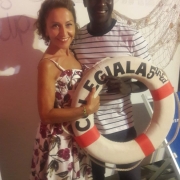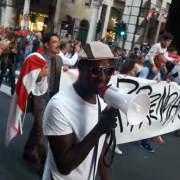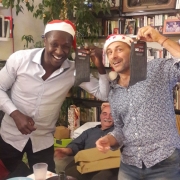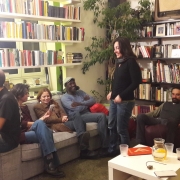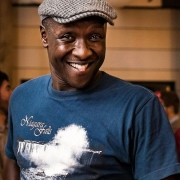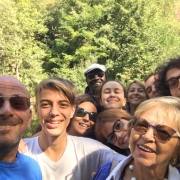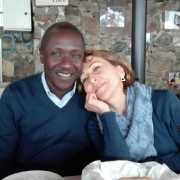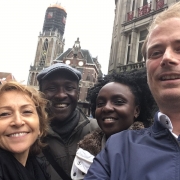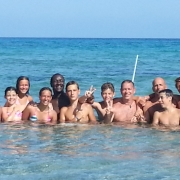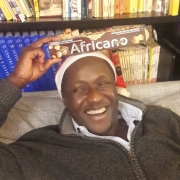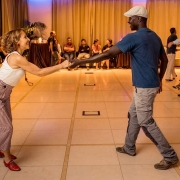Do you know the phrases addressed to anyone with a minimum of common sense, which in a defiant tone are being thrown up on the social networks or, even more worryingly, declared by some representatives of the current government? Phrases referring to migrants as: “Take them at your home!”, or even, “Welcome refugees at your home!”. As if this could have some minimal meaning within a collective political debate, as if the health or public transport issues could be solved with a “Cure the sick at your home!”, or, “Take the commuters work with your car!”.
Well, I grew up with a non-EU at home, and I assure you that it’s not that bad.
Emmanuel Komakech was born in 1972 in the capital of Uganda, Kampala, on the shores of Lake Victoria. He grew up in a very large family, made up of 8 brothers, as many uncles and about thirty cousins, a quite common situation in the African continent. In 1976, following the rise to power of the dictator Idi Amin Dada¹, the whole family was forced to flee to Kenya, then to Zambia and finally to Tanzania. The long migration ended in 1980 when they could return to Uganda, immediately after the tyrant’s fall, in fact Emmanuel’s father was a university professor, therefore he represented one of the main threats in the eyes of a dictatorial power that wanted to maintain control over an ignorant country.
After completing his high school studies, Emmanuel decided to study Electronic Engineering, so he managed to find an agreement with the Italian Embassy in Uganda that promoted an educational exchange between the two countries. He attended an Italian course, passed the entrance test at the University of Pavia and in 1994 he began his engineering studies with a student visa; his sister, who was already studying medicine in Italy, helped him with the insertion and the documents necessary for registration.
The sense of responsibility towards his family accompanied him until he graduated, passing through many difficulties. The first obstacle was the economic one, in fact Emmanuel could not access a scholarship, so he was forced to alternate school and work to pay for food, clothing and rent. During the intense and difficult years of the University he did any type of work: assembly, porterage, security service in clubs and events, mechanic, antiques, gardening, removals and fruit picking in the fields. Obviously, all this was paid off-books, and when he asked to be put in regulation he was systematically removed. Finally, in his last university period, he was able to find a job that guaranteed him a regular contract as “Educator’s Assistant” at the Istituto Milanese Martinitt e Stelline², which deals with the reception, protection, maintenance, education, psychophysical development and professional training of children in difficulty. The Educational Community welcomes children and adolescents, Italian or not, temporarily without family references or separated from the family by the Juvenile Court. During this experience Emmanuel learned a lot about the cultures of different nationalities, he helped many young people in the process of social reintegration and worked the night shifts, so he was able to attend university classes during the day, finally succeeding in graduating.
After a complicated university career, however, he had to find a job. He sent hundreds of CVs to many Italian realities; however, he was hardly ever considered. Finally, a Milanese company seemed to have been interested in his profile and after an interview they decided to hire him. The relationship with colleagues is excellent right from the start, so much so that, even today, he works in the same place.
The company is called Myenergy³ and deals with the design, installation and testing of photovoltaic systems. The mission of the company is to develop sustainable solutions that aim at energy efficiency, the development of renewable energy sources respecting the environment. Myenergy follows all laws and regulations concerning health, safety, and the environment, developing innovative solutions aimed at saving energy and reducing CO2 emissions, to ensure a sustainable future for the new generations.
In this case, he is responsible for the design and monitoring of photovoltaic systems, with particular attention to their maintenance solutions. Therefore, he not only regularly pays contributions to the State, but also contributes to its growth in terms of energy and environmental innovation. He is an example of how integration can positively enhance our country, at all levels.
Emmanuel is 47 years old and has been my mother’s partner for 12 years.
For most of my adolescence I lived with them (when I was 18 I went to live alone) and more or less directly I witnessed the complications of being an immigrant in Italy. I remember the endless queues at the Police Headquarters that were told to me with resignation, underlining the fact that whether or not the success of the consultation strictly depended on who was in the offices at that time. I remember that due to a twisted system and totally devoid of simplification (quite frequent in Italy) he spent his free days cataloging the documents required by the State, bent on the ground to consult the sheets scattered on the floor, like a paper carpet. I remember the discrimination he suffered and still suffers today, even if, after a biblical bureaucratic process he managed to obtain the Italian citizenship by swearing on our Constitution⁴.
He represents, at least for me, the living proof that the integration of an individual in our country is not only possible, but it is also a social and economic benefit.
But why am I telling you about him? I believe that integration is not only possible and positive, if managed with the right means, but I am also convinced that it is a necessity for our country. Let me explain.
First of all, there are generational consequences (Baby Boom between ’45 and ’64) that have developed a physiological need for new taxpayers within our pension system, otherwise, as it was thought, it cannot sustain itself. The integration of new individuals is also the integration of new taxpayers in the system. Due to the specific target of immigrants, who generally migrate during their working age, the State can get all the advantages⁵.
Then there are the economic implications that suggest the need for new lymph injected in the national market, especially to counter the continuing recession that characterizes us. If politics found a system of acceptance, through regulated and effective management, and then succeed in integrating people into the economic fabric, the latter would grow according to the incoming flow, obviously I am referring to a long-term vision. It is precisely the long term I would like to talk about, because it would seem that the political debate has fossilized on a reactive perception of the “problem” of immigration, while in this case a pro-active reaction is necessary.
Finally, there is a fundamental demographic issue, closely linked to the previous points. In fact, in Italy the birth rate is lower than mortality, we are a country in demographic decline, and this is also found in the beautiful villages scattered throughout the territory, which are gradually abandoned or die of slow and painless death. Then there is the inverse situation outside the nation, that is, a planet in continuous population growth, a world population that now has about 8 billion individuals. There are too many and a redistribution of people on the earth’s surface can be beneficial, certainly functional. From our point of view, we would need new inhabitants to be integrated into all those villages and towns that are slowly disappearing. A virtuous case in this sense was the episode of the “Riace Model” promoted by Mimmo Lucano. The mayor of Riace managed to combine the challenge of hospitality with the relaunch of his community. Through an Active Integration, Riace countered the depopulation by recovering the abandoned houses and rescuing the old trades and crafts that were passed on to the newcomers. Is the model exportable? Lucano answered this question two years ago when he was included in the ranking of the magazine ‘Fortune’ among the 50 most influential personalities in the world (the only Italian): “It takes graduality”, but, he stressed, “where humanity prevails, it is always an exportable model”⁷.
However, in Italy the situation is quite different, we are witnessing an almost perfect political mechanism. Matteo Salvini, who unlike his electorate is not totally ignorant in terms of immigration issues, is building a disturbing political strategy. Follow the reasoning.
Salvini is bringing integration levels to historic lows (blocking the SPRAR⁸ centers, abolishing humanitarian protection, etc…) knowing well that the migratory flows are not controllable at all, historically, they can be managed but not stopped. Therefore, the only consequence of a closure on immigration is not the decrease in immigrants, but an increase in irregular immigration at the expense of the regular one. So, as history teaches us, irregular immigration leads illegal immigrants to crime, simply because they have no other means to survive. As a result, tomorrow when, because of his policies, the immigration rate will not have decreased, but will have degenerated into crime, then he will still have the opportunity to stay in power, stronger than before, pointing to migrants as the enemy. A character who calls himself “the Captain” and who appears in public wearing the uniforms of the Police Force must necessarily have an enemy, just to politically survive.
The Decreto Sicurezza⁹ (Security Decree) is unacceptable and is only the beginning of a political plan that must be stopped with all the means at our disposal, Emmanuel would not have had the opportunity to become the person he is if the Decree had been applied at the time of his arrival in Italy, I would not have had the chance to known him and you would not have been reading this article.
In order to undertake an Active Integration in our country, three parallel interventions are necessary: Education, Information and Social Policies.
First of all, we must educate children to welcome, teaching tolerance and not indifference. We must start from families and schools, teaching Civic Education, Human Rights, valuing the opportunity of mixed classes.
Then we must sensitize the Information, generating a “school of journalism” up to the task, that is intelligent and instructive and that does not bow to political trends but above all that is not dominated by readers’ preferences, making embarrassing compromises for a handful of clicks; it is they who must influence and inform the public and not the other way around.
Finally, fairer social policies, but not only at the national level, especially at the international level. If we continue to exploit the poorest countries, pillaging their natural resources and destabilizing local governments, the migratory flow will become increasingly unmanageable.
It is as if we do not realize that the cause of all this is us, the Western countries, both in terms of political and economic migrants, we are always the cause. We throw the stone, and not only hide the hand, but we also blame the stone. We suck up resources without giving anything in return, instead, then we bring their local economy to its knees by selling them what we produce with their resources at bargain prices, and as if that were not enough we maintain political instability to be able to act in this way. Then we complain, as obese and capricious infants, that they claim the Fundamental Human Rights, which we invented.
“Oh, no … for them the rights are not valid … beautiful the Human Rights … but they are valid only for us!”.
In a European Union of over 500 million inhabitants, from the top of our value system, we bounce 47 desperate people stuck in the middle of the sea¹⁰, for our sake, who have the only fault of wanting a better future. But even if they were 470 people, or 4,700, or 47,000, we should still give them the Right to Be Human.
Then History will put these facts together and we will deal with the “truth”, if we really are the “good” ones.
I believe that even though we think we are absolved, we are forever involved.
Translated into English by Marco Grattarola.
¹ Idi Amin Dada, www.wikipedia.it, date of consultation 27/01/2019.
² Servizi educativi per minori, www.iltrivulzio.it, date of consultation 22/01/2019.
³ Soluzioni energetiche sostenibili per aziende, privati e enti pubblici, www.myenergy.it, date of consultation 15/01/2019.
⁴ Procedura per Cittadinanza e Fasi, www.cittadinanza.biz, date of consultation 10/01/2019.
⁵ L’economia dell’immigrazione: intervista a Carlo Devillanova, www.agora-magazine.com, last modified 01/02/2019, date of consultation 01/02/2019.
⁶ La politica dell’immigrazione: intervista a Giampiero Cama, www.agora-magazine.com, last modified 01/02/2019, date of consultation 01/02/2019.
⁷ Come funziona il “Modello Riace” di Mimmo Lucano, il sindaco ribelle alle “leggi balorde”, www.today.it, last modified 02/10/2018, date of consultation 03/01/2019.
⁸ Accogli migranti e ricevi fondi? Ora il dl Salvini dimezza i soldi, www.ilgiornale.it, last modified 12/11/2018, date of consultation 05/01/2019.
⁹ D. L. 4 ottobre 2018, n.113, Disposizioni urgenti in materia di protezione internazionale e immigrazione, sicurezza pubblica, nonchè misure per la funzionalità del ministero dell’interno e l’organizzazione e il funzionamento dell’Agenzia nazionale per l’amministrazione e la destinazione dei beni sequestrati e confiscati alla criminalità organizzata.
¹⁰ Alessandra Ziniti, Sea Watch, Corte di Strasburgo chiede all’Italia assistenza ma non lo sbarco, www.repubblica.it, last modified 29/01/2019, date of consultation 30/01/2019.


